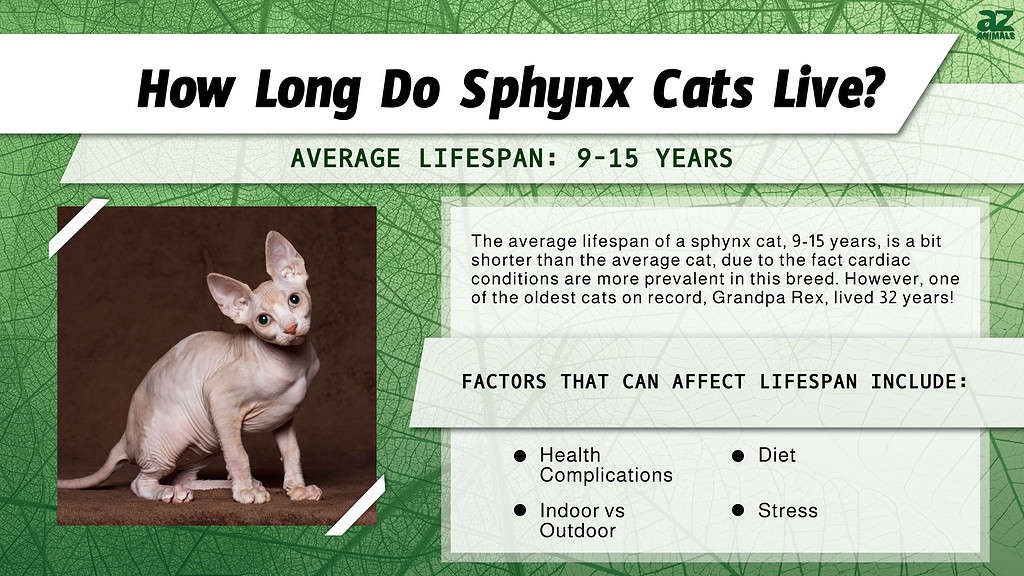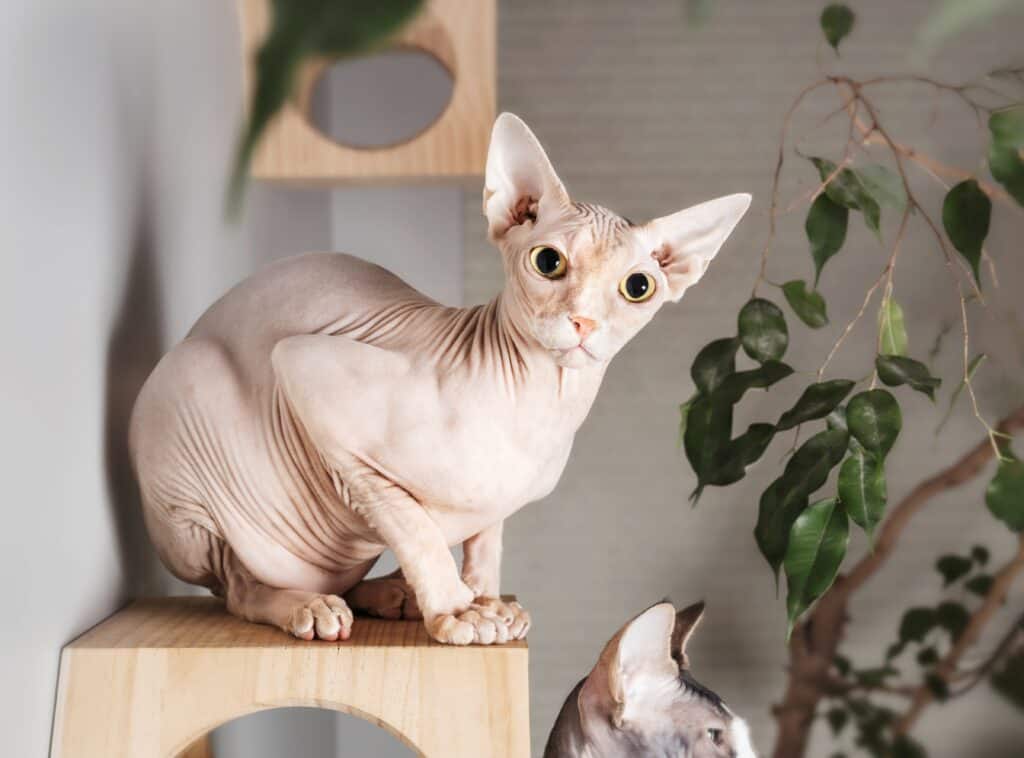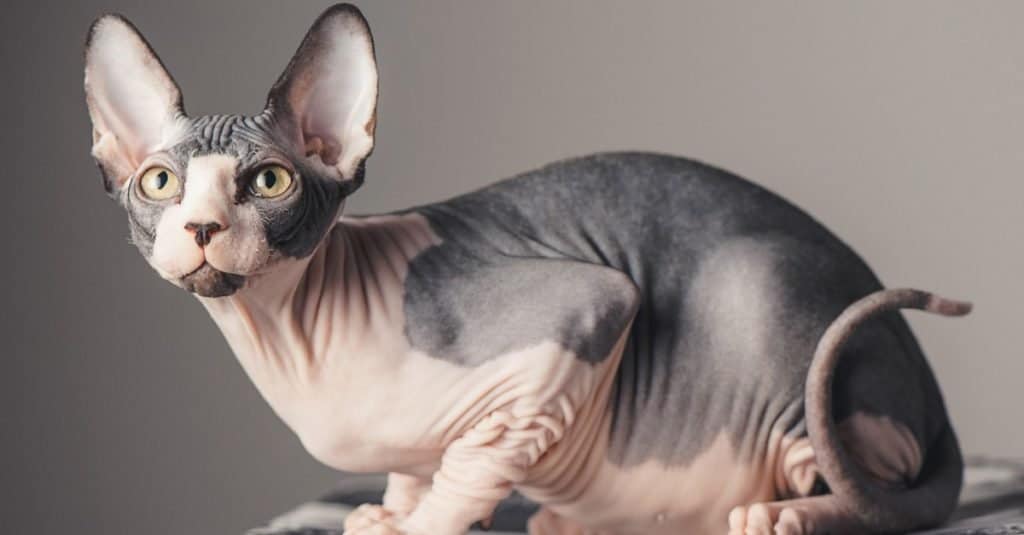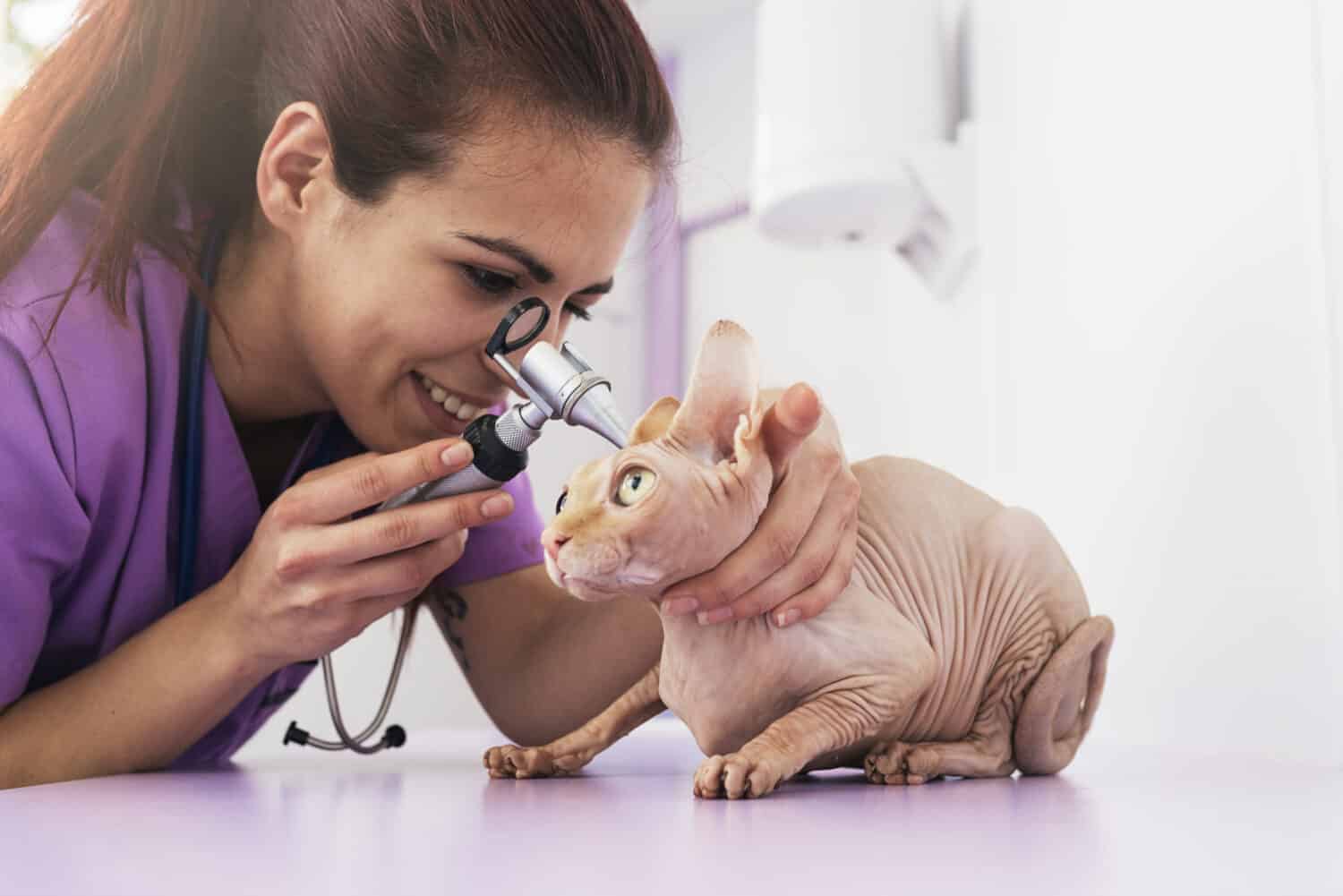There is no cat quite like the sphynx cat! From their hairless bodies to their unique personalities, this feline friend truly is one of a kind. It’s no wonder so many people have fallen in love with this special breed.
Do you plan to welcome a sphynx cat into your family? If so, now is the perfect time to learn about their general lifespan. From age progression to common health issues seen in the breed, we discuss it all!

How Long Do Sphynx Cats Live?
On average, the sphynx cat lives anywhere from 9 to 15 years. This lifespan is a bit shorter than the average cat. This is due to the fact that cardiac conditions are more prevalent in the sphynx than other cat breeds. However, keep in mind that this lifespan is an average range, and every sphynx cat is an individual!
For example, one of the longest living cats on record was a sphynx! A sphynx named Grandpa Rex is said to have reached an impressive 32 years of age. This shows that the nine-15-year lifespan is not always concrete.
The Average Sphynx Cat Life Cycle

The sphynx cat has an average lifespan of nine to 15 years.
©sophiecat/Shutterstock.com
As a future sphynx parent, you may be curious about the general age progression of your sphynx from kittenhood to maturity. Let’s break down each life stage.
Kitten
Sphynx cats are typically considered kittens from the time they are born to about six months of age. Your sphynx kitten will typically begin to show interest in wet kitten food at about six weeks old. This will encourage them to wean off their mothers. It’s best to offer your sphynx kitten a combination of wet and dry kitten food until six months of age. You can then transition him to an adult kibble over a two-week period.
It’s also best to have your kitten examined by a vet beginning at eight weeks old. This is a great time to start kitten vet care and vaccinations. You can also consider spaying or neutering your sphynx cat from the time he is six months and older.
Adolescence
Sphynx cats are considered teenagers or adolescence between the age of six months to one year. Your sphynx will likely be a bundle of energy at this point, as they still have that playful kitten nature. It is very important to offer your sphynx plenty of mental and physical stimulation each day during this period. This will help to cut down on any bothersome behaviors.
Adulthood
Sphynx cats are considered adults once reaching one year of age. However, they may still act like kittens for years to come. Your sphynx will reach maturity at one year. However, you may see her fill out until she is about three years old. Your adult sphynx may still have some kitten-like tendencies, but you will also notice her becoming much cuddlier and calmer.
Senior
Sphynx cats are considered seniors once they are seven years old. Their lifespan is a bit shorter than the average cat, so they reach their senior years a bit earlier as well. Your sphynx will likely be much calmer during this period. She will love nothing more than cuddling up with her owners at any given chance.
This is also the time in which age-related health complications may develop. We suggest having your kitty assessed by a vet a minimum of once yearly. Your vet can also keep an eye out for any sign of cardiac disease during these exams.
Factors That Threaten the Sphynx Cat’s Lifespan

The Sphynx cat is known for being very clingy, and they are happiest when they are at their owner’s side.
©Yuryi Oleinikov/Shutterstock.com
The best way to promote a long and happy life in your sphynx cat is through awareness. Remain on the lookout for factors that threaten their health. Here are a few of the most common factors that impact the sphynx cat’s lifespan.
Health complications: Unfortunately, cardiac disease is very common in the beloved Sphynx. They are most prone to a cardiac condition known as HCM, or hypertrophic cardiomyopathy. It is believed to be a result of a genetic mutation that is prevalent in the breed. It eventually leads to cardiac failure. Not all sphynx cats will develop HCM, but it’s important to be aware of it!
Stress: Stress can deeply impact the sphynx cat. Not only do they become incredibly bonded to their owners, but they crave routine and structure. These little ones are also known to struggle with separation anxiety. Any constant changes in their routine or surrounding family can be difficult for them to manage. While there’s no way to prevent stress completely, you can try to create a stable and comfortable home.
Indoor vs. outdoor: Indoor cats typically have longer lifespans than outdoor cats. This is due to the fact that outdoor cats are exposed to infectious disease, cat fights, weather, and cars. It is ideal for a sphynx cat to be indoor only when possible.
Diet: Cats are obligate carnivores, so it is essential that they eat an AAFCO cat food made with animal protein. This is even more critical in the sphynx cat, as vegetarian diets in cats can lead to cardiac complications. The sphynx cat is already at risk of cardiac disease, so you never want to exacerbate these issues.
How To Extend the Lifespan of Your Pet Sphynx Cat
Let’s now discuss some of the most effective ways to promote your cat’s ongoing health!

Sphynx cats should have yearly wellness exams with a vet to check for any signs of cardiac disease.
©santypan/Shutterstock.com
Annual vet appointments: Annual wellness exams are essential for your sphynx cat, as this can help your vet keep an eye out for any signs of cardiac disease. One of the most common signs of HCM in cats is a heart murmur, and your vet can catch this during a physical exam. Cardiac disease can be managed for extended period when it is caught early on, ultimately extending your cat’s lifespan.
Dental care: Maintaining your cat’s dental care is another way to promote health and happiness. Not only is dental disease painful for your feline friend, but dental bacteria can enter their bloodstream and impact their heart and kidneys. Again, since cardiac disease is so common, you never want to exacerbate this issue.
Healthy diet: A healthy diet is a great way to promote optimal heath in the sphynx cat. A healthy and balanced diet will not only help them feel their best, but it can prevent a variety of health complications that come along with a poor diet. Some of these complications include obesity, diabetes, digestive complications, and more.
Spaying or neutering: The decision to spay or neuter your sphynx is a personal choice, but sterilizing your feline friend can prevent reproductive complications down the line. An intact sphynx has an increased risk of reproductive infections, reproductive cancers, and even stress that comes along with hormonally driven behaviors. Even if you do plan to breed your sphynx early in their adulthood, you can always spay or neuter them at a later time.
Final Thoughts
The sphynx cat is a wonderful companion to have at your side. Be sure to review the information we discussed above about the sphynx lifespan, and you will have the tools needed to offer your cat a long and happy life!
The photo featured at the top of this post is © Olllllga/Shutterstock.com
Thank you for reading! Have some feedback for us? Contact the AZ Animals editorial team.






